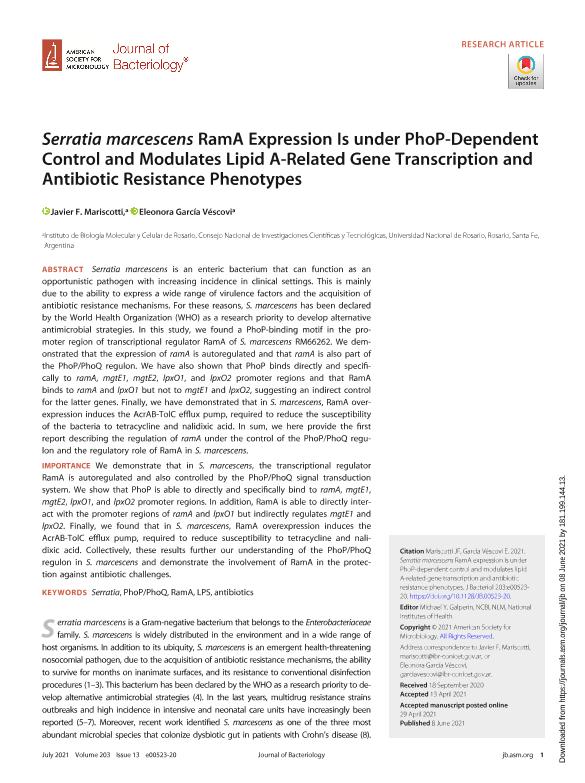Mostrar el registro sencillo del ítem
dc.contributor.author
Mariscotti, Javier Fernando

dc.contributor.author
Garcías Vécovi, Eleonora
dc.date.available
2023-01-12T14:06:54Z
dc.date.issued
2021-06
dc.identifier.citation
Mariscotti, Javier Fernando; Garcías Vécovi, Eleonora; Serratia marcescens RamA expression is under PhoP-dependent control and modulates lipid a-related gene transcription and antibiotic resistance phenotypes; American Society for Microbiology; Journal of Bacteriology; 203; 13; 6-2021; 1-16
dc.identifier.issn
0021-9193
dc.identifier.uri
http://hdl.handle.net/11336/184540
dc.description.abstract
Serratia marcescens is an enteric bacterium that can function as an opportunistic pathogen with increasing incidence in clinical settings. This is mainly due to the ability to express a wide range of virulence factors and the acquisition of antibiotic resistance mechanisms. For these reasons, S. marcescens has been declared by the World Health Organization (WHO) as a research priority to develop alternative antimicrobial strategies. In this study, we found a PhoP-binding motif in the promoter region of transcriptional regulator RamA of S. marcescens RM66262. We demonstrated that the expression of ramA is autoregulated and that ramA is also part of the PhoP/PhoQ regulon. We have also shown that PhoP binds directly and specifically to ramA, mgtE1, mgtE2, lpxO1, and lpxO2 promoter regions and that RamA binds to ramA and lpxO1 but not to mgtE1 and lpxO2, suggesting an indirect control for the latter genes. Finally, we have demonstrated that in S. marcescens, RamA overexpression induces the AcrAB-TolC efflux pump, required to reduce the susceptibility of the bacteria to tetracycline and nalidixic acid. In sum, we here provide the first report describing the regulation of ramA under the control of the PhoP/PhoQ regulon and the regulatory role of RamA in S. marcescens. Importance: We demonstrate that in S. marcescens, the transcriptional regulator RamA is autoregulated and also controlled by the PhoP/PhoQ signal transduction system. We show that PhoP is able to directly and specifically bind to ramA, mgtE1, mgtE2, lpxO1, and lpxO2 promoter regions. In addition, RamA is able to directly interact with the promoter regions of ramA and lpxO1 but indirectly regulates mgtE1 and lpxO2. Finally, we found that in S. marcescens, RamA overexpression induces the AcrAB-TolC efflux pump, required to reduce susceptibility to tetracycline and nalidixic acid. Collectively, these results further our understanding of the PhoP/PhoQ regulon in S. marcescens and demonstrate the involvement of RamA in the protection against antibiotic challenges.
dc.format
application/pdf
dc.language.iso
eng
dc.publisher
American Society for Microbiology

dc.rights
info:eu-repo/semantics/openAccess
dc.rights.uri
https://creativecommons.org/licenses/by-nc-sa/2.5/ar/
dc.subject
ANTIBIOTICS
dc.subject
LPS
dc.subject
PHOP/PHOQ
dc.subject
RAMA
dc.subject
SERRATIA
dc.subject.classification
Bioquímica y Biología Molecular

dc.subject.classification
Ciencias Biológicas

dc.subject.classification
CIENCIAS NATURALES Y EXACTAS

dc.title
Serratia marcescens RamA expression is under PhoP-dependent control and modulates lipid a-related gene transcription and antibiotic resistance phenotypes
dc.type
info:eu-repo/semantics/article
dc.type
info:ar-repo/semantics/artículo
dc.type
info:eu-repo/semantics/publishedVersion
dc.date.updated
2022-09-07T19:20:17Z
dc.journal.volume
203
dc.journal.number
13
dc.journal.pagination
1-16
dc.journal.pais
Estados Unidos

dc.description.fil
Fil: Mariscotti, Javier Fernando. Consejo Nacional de Investigaciones Científicas y Técnicas. Centro Científico Tecnológico Conicet - Rosario. Instituto de Biología Molecular y Celular de Rosario. Universidad Nacional de Rosario. Facultad de Ciencias Bioquímicas y Farmacéuticas. Instituto de Biología Molecular y Celular de Rosario; Argentina
dc.description.fil
Fil: Garcías Vécovi, Eleonora. Consejo Nacional de Investigaciones Científicas y Técnicas. Centro Científico Tecnológico Conicet - Rosario. Instituto de Biología Molecular y Celular de Rosario. Universidad Nacional de Rosario. Facultad de Ciencias Bioquímicas y Farmacéuticas. Instituto de Biología Molecular y Celular de Rosario; Argentina
dc.journal.title
Journal of Bacteriology

dc.relation.alternativeid
info:eu-repo/semantics/altIdentifier/doi/http://dx.doi.org/10.1128/JB.00523-20
dc.relation.alternativeid
info:eu-repo/semantics/altIdentifier/url/https://journals.asm.org/doi/10.1128/JB.00523-20
Archivos asociados
